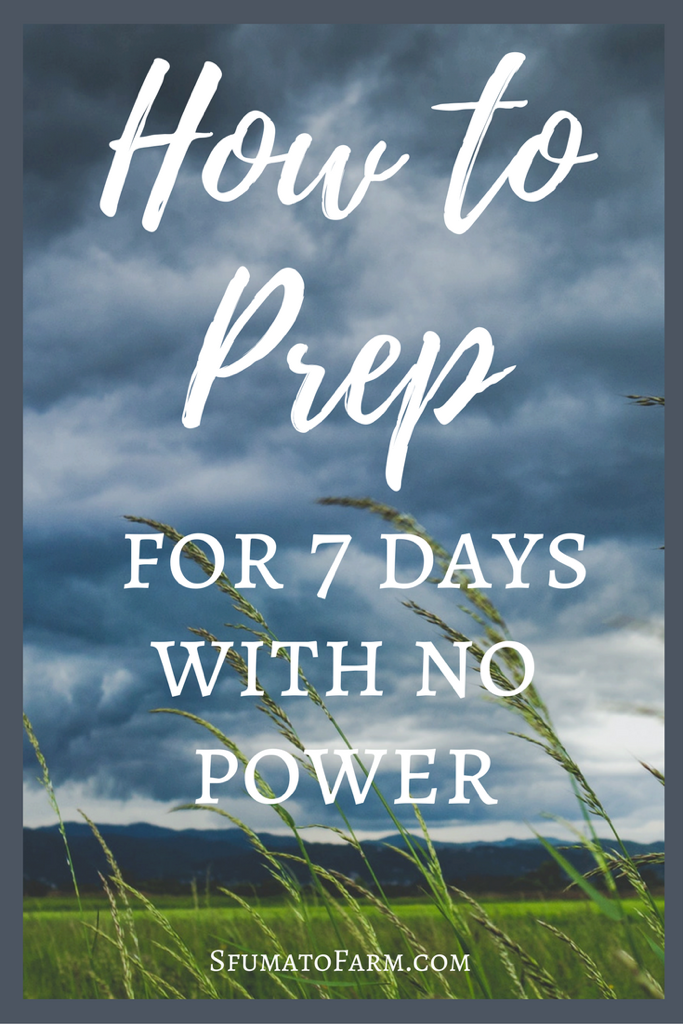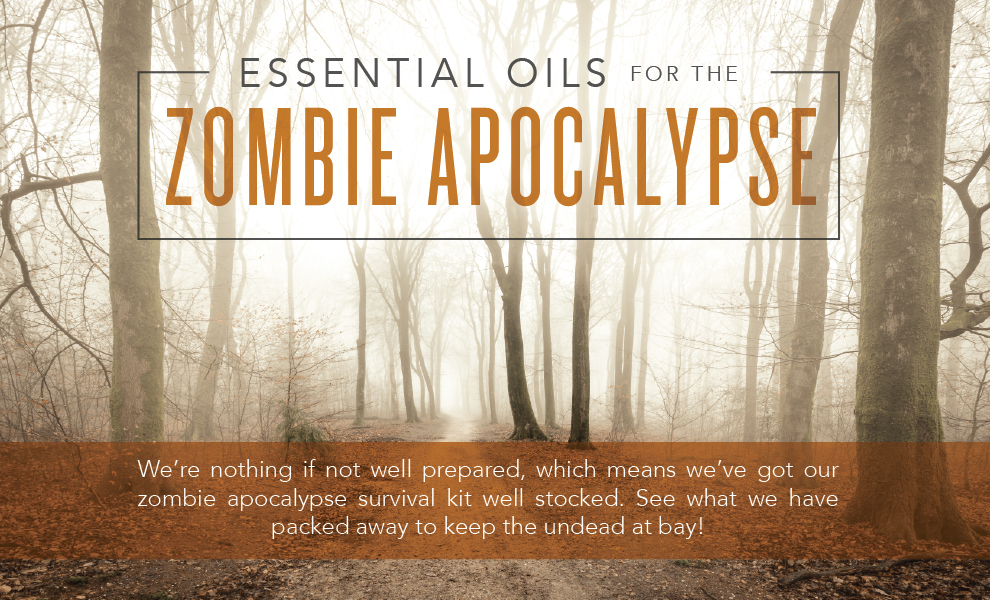Intro to Preparedness

Recently, some friends who are new homeowners asked us about the basics of being prepared.
Here's their primary question:
Now that we're semi-normal people who actually live in a house, I'm trying to figure out how to be somewhat prepared (hurricanes make you think...).
So...here's where we are. I'd like to feel prepared for a few days to a week of power/infrastructure going down. Not ready to go all out for society going down long term, but where do we start?
They have some other specific questions which we will tackle in turn.

Looking at the commonality of regional disasters (hurricanes, earthquakes, etc.) there's a lot of things that are pretty straightforward, easy to accomplish, and even FEMA recommends that you do. You basically want to create a portable kit that can sustain you without additional inputs for up to seven days. 72-hours is a good start, but many of the recent hurricanes have had people out of power for 2 weeks or more.
We say "portable" because we want this kit to be easy enough to load in a car or truck so you can take it with you if you need to evacuate. Often this can be achieved through a combination of backpacks, rubbermaid totes, and other supplies you'll find in the camping section at Walmart or Amazon.
Most of the things we'll talk about here should not be "dump it in the closet and forget it" but items that you can use in your regular life.
Shelter, Water, Fire/Energy/Light, Food, Communication, and Security are your big areas of concern. First things first, let's talk about shelter.
Shelter
Normally this is your apartment, house, RV, etc. Exposure, especially in cold climates, can kill very quickly. Anyone who has done winter camping will tell you how miserable it is when everything is cold AND the wind is blowing hard. Summer is easier, but still, heat stroke and heat exhaustion can do a number on people and are especially difficult for the elderly and infants.
If you're in a tornado-prone area, you should consider building a tornado shelter or safe room in the house somewhere. The probability is low that you're going to get hit, but if you do it's almost an all-or-nothing kind of thing. We might have a tornado warning once a year (or two years) here between the Blue Ridge and Southwest Mountains. It's a low likelyhood for us.
For a homeowner, if you have a hurricane threat, get those plywood pieces for windows cut and stowed in the garage somewhere. Get some tarps and some roofing nails to cover any damage you may have to your roof. If you're in a flood-prone area, get flood insurance and honestly, look for a new place to move.
In any case, a camping tent can be a good fallback here. Also, if you have to evacuate, where are you evacuating to? Having the numbers of hotels in a bunch of towns already on a piece of paper that you can call as you are leaving will save you a lot of googling in a stressful situation. Do those hotels take pets? You don't want to waste time when you're talking about your comfort during an evacutation.
Water
How much water should we have? If we throw bottled water in the basement, how long can we keep it before it needs to be replaced?
Oh, thank you New Jersey for your stupidity with water expiration regulation. It's repealed now, yet expiration dates persist. Water, unless it is contaminated, does not go bad. Plastic could leech chemicals into the water, but that could have happened even with "unexpired" water. There's ways to deal with that.
For portable, a Katadyn Hiker Pro Microfilter is a good bet. A Camelbak
or collapsable canteens are also great. For staying put (or "bugging in"), you should get a WaterBOB (100 Gallons)
for each bathtub you have. If you know a storm (hurricane or winter variety) is coming, fill it up. If you rely on a well and not city water, you really need to do this. City water will stay pressurized for a while due to water towers, but wells rarely have enough pressure on their own to move the vertical column into the house.
I keep water in 5 gallon/20 liter Government Surplus jerry cans. These are thick, plastic containers that are manageable by one person. Anything more than 5 gallons is really heavy to move. We rotate the water out once a year and pour it onto the garden.
You can treat any water with unscented, liquid bleach (or the equivalent created from solid pool shock or similar product). There's a lot of cheap bleach out there that doesn't do the trick. Good, basic, unscented, run of the mill Clorox will do you right. FEMA ([https://www.ready.gov/water](Ready.gov site)) has some great guidelines on water storage and purification.
I'd also recommend a Big Berkey BK4X2 Countertop Water Filter System . We used ours when we lived in the city, and I still use ours for the second well that feeds the barn without filters. This is a ceramic filter in a metal container. If you drink a lot of water, get a big one and put it on your counter. You'll get rid of that nasty chlorine smell/taste too that you probably don't even realize you have. You can create one of these out of 5 gallon buckets if you're so inclined.
Having a Coleman Propane Stove and a propane tank will let you easily boil water with your existing kitchen pots. If you have a boil-order from the local government, you want to make sure you do this.
Fire/Energy/Light
Should we get a generator?
Do we want to have a extra gas (or other fuel) in the garage?
Yes and Yes.
The easiest setup is to get a whole-house gas generator (if you have gas to your house). These are often just a setup that will automatically kick in and run your house at almost full power. Even when the power is out, natural gas systems tend to work for a good while longer, and the pressure is maintained in the pipe.
If you're not able to get natural gas piped to your house, you can do a propane tank (large) with a similar setup. You can also look at various 6kW or so generators (which start at about $1,000 and go up rapidly from there). These are not filtered power and can fluctuate a lot, which can be bad for plugging sensitve electronics into.
The Honda EU2000I and the Yamaha EF2400iSHC
are both great, portable generators that will power most individual appliances as needed (e.g. your fridge for a while). They also have "low use" modes, which drop the engine down to a very slow idle when there's not a strong power draw on them.
You want to have some heavy gauge extention cords and power splitters to run things from your generator running outside (and ideally chained down in a suburban or urban setting) to various points where you need power.
As for gasoline, we use 5 gallon Wavian NATO jerry cans. They are expensive, but I've been through at least a dozen of the CARB-compliant (California Air Resource Board) plastic cans and every single one of them has split the seam along the handle, leaking gas fumes into our garage. You should look and find a local gas station that sells ethanol-free gasoline and stabilize it with PRI-G Fuel Stabilizer (or D if you're running diesel).
You also need to store oil for your generator. Most generators need an oil change after 24-48 hours of continuous use. This is why it's often better to charge up a battery bank and then run from batteries than just the generator running full time. This also applies to whole house generators. Keep a case or two of oil on hand as well as replacement parts for the generator.
Your car is a generator
If you're in a pinch, at least get a 1000W Power Inverter for Home & Car . You'd run your car when you do this, but you can power a lot off a car at idle. It'll burn gas faster than an efficent generator, but it's another level of protection.
Build a blackout kit
So lights just went out. What do you do? Where is everything? Get a rubbermaid tote and make it your blackout kit:
- Some flashlights
- batteries for those flashlights
- Headlamps
- portable LED lanterns
- Sanctuary candles (safer in the glass jar than just tapers)
- etc.
This kit should be your starting point in any power outage. It doesn't need to include everything, just the basics to get you up and operating (and seeing, especially at night).
Wood stoves and fireplaces
Growing up in Hampton Roads (Yorktown, Virginia) we would often lose power for a few days due to an ice storm in winter. My dad had installed a Vermont Castings Wood Stove insert into our fireplace and he ran it most of the winter. He still does. There was one Christmas I remember when I was back from college (so 96? 97?) that we lost power for Christmas. We put up lanterns and candles and had the wood stove going full bore. We closed off rooms that were not essential and had a nice, quiet, no-television holiday.
Food
I guess we need some sort of non-perishable food, though my minimalist tendencies are conflicted with being prepared! What's something that makes sense, but isn't crazy stuff that we'll never actually eat short of a disaster?
Eat what you store. Store what you eat.
I mean, sure, buy a case or two of MREs (with heaters) and throw them in the bottom of a closet or the pantry. The darn things last forever and you'll at least have something that requires nothing but water to heat up (the heater is a bag with a chemical liner that creates an exothermic reaction when water is poured in the bag). When things are stressful, you may just need some food you can heat up and run with.
Besides that, the best way to do food is to create a deep larder and food rotation. Take a notebook and write down everything you eat for a month. If something is food that is bought in a relatively non-perishable/shelf-stable format, put a star next to it.
At the end of the month, there will be a lot of things with stars that you can buy. The easiest way to do this is to do what's called "copy canning". Buy twice what you need when you go to the grocery. When you get home, put one in a rubbermaid tub, and the other in your pantry. Now, the next time you find you're out in the pantry, pull one from the rubbermaid tub. Eventually, you'll be refreshing your pantry from the rubbermaid tub(s) and then rotating through tubs and replenishing those from grocery trips. You can keep adding tubs to the rotation to extend your supply, and you're not ending up with some can buried at the back of a closet somewhere.
If you have a cellar or other dark and relatively climate stable area, you can do this on shelves as well. Just make sure you try to do first in first out on everything.
Buying in this manner also lets you take advantage of sales and couponing.
Communications
Do we want some sort of battery radio? Is there other tech stuff you can buy that will work if internet/phones go down?
In most emergencies, cell phone towers have generators that will keep that network up and running for at least a few days. You may find that certain towers are damaged and you can't call. In these cases, always try SMS (not iMessage) and see if that will get through. More often than not it works even when voice doesn't.
Outside of cell backups for internet (e.g. with tethering from your phone or a hot spot), there are three steps you can look at.
First, is a satellite phone or hotspot. These are expensive and aren't fast, but they work when nothing else will. Iridium and Globalstar are the two main companies offering service in the CONUS and beyond. This works pretty much like a cell phone of 10 years ago. You need a clear view of the sky as well. You can run your computer over this in most cases as well for at least email and basic web browsing.
Second, is HAM Radio. You can communicate locally, regionally, and internationally with a relatively simple (and in most cases portable) setup. Start by getting your Technician license. That lets you talk locally (2m, other VHF/UHF bands) and on a few other frequencies that can be used for regional communications (6m, 10m). Upgrade to General and you have almost full privledges (at least functionally).
It's a multiple choice test and they put out the questions. It's pretty easy to pass, and you just need to learn some basics of radio and electronics (or memorize the answers to the questions).
If you don't get your license, at least pick up a shortwave radio with sideband reception. This will let you listen but not talk. In a severe regional emergency, news and intelligence from the outside world is critical. You can receive weather data from NOAA with something called WEFAX and other cool and valuable tricks.
Third, is something that's new to the market called "GoTenna". It basically lets you connect cellphones without a tower. People use this for camping and backwoods exploration. You can talk to each other, but can't call out. You can also look at inexpensive FRS radios (no license required) for similar funcitonality (extremely local communications).
Security
Situational awareness is really key here. You need to be aware of your surroundings and alert to possible threats. Move away from any perceived threat.
You should also have some form of defensive weapon. A pump shotgun and sidearm would be more than adequate for most things. NEVER fire warning shots. The author Massad Ayoub has written extensively on this stuff and covers this topic in more detail than I could ever hope to.
Be sure you figure out your state's laws before you buy anything. Every state is different and some are downright draconian. Follow the law where you are.
Other stuff
FEMA has some handy lists of things you should have on hand that will help you get started if all this seems a bit overwhelming.
Is there any benefit to having some cash around? (Or do you do gold???)
Yes. If the power is out, ATMs are down. Credit Card processing systems are down. Cash still works. You should have $100 or so on you most of the time. At home, if you can, I'd look at doing 100 of each of the following denominations:
$20
$10
$5
$1
That will give you $3600 and let you make change pretty easily. Throw in two rolls of quarters too. That would last you through almost any short term emergency.
Gold/Silver wise - this is more of a store of wealth and a hedge against inflation. It should be part of your overall financial plan (many people say 10% of your net wealth in gold/silver), but in any disaster, we won't be sliding into a barter economy that quickly.
Any other basic tips that make a big difference?
Rabbit hole, here we come!
In all seriousness, here's a bunch of things to look at and think about for your particular situation:
- Chainsaw and protective gear for using it. When trees are down, you need to clear them as long as they're not entangled with downed power lines.
- Get your personal data digitized and on USB drives (we like the Survivor waterproof USB). Also build a binder with critical information and store one in each car, as well as in the house.
- A Delorme Atlas for your state and neighboring states if you live close to a border. It has all sorts of paths and trails marked in addition to roads.
- Take a CERT class.
- Take CPR and First Aid classes.
- Get home bags in every car (if you had to walk from work, etc. home, how long would it take? what would you need?)
- A window a/c unit that can run off the generator. When it's 95°F and humid, you can make one room in your house at least reasonable. Most important if you have an infant or elderly with you.
So we've got 7 days (and change) taken care of. Now what? From here it's looking at your potential for disasters in your area, determining what you'd need time wise, and then storing accordingly. It's difficult to have more than a week that is easily portable, but there are methods that get you moving in this direction.
If you need further motivation, Whitney recommends watching The Walking Dead or reading the book (One Second After).


